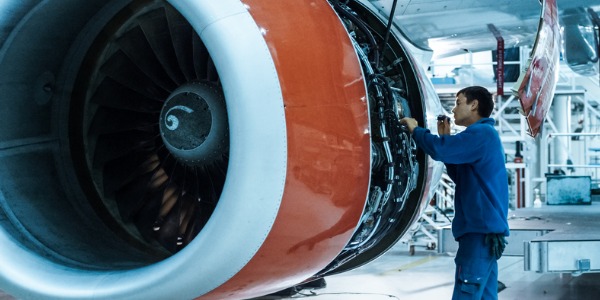What is an Avionics Technician?
Avionics focuses on aircraft electronics. An avionics technician is responsible for all the electronics aboard an aircraft as well as the wiring that connects to the electrical system. They run cables, mount antennas, and connect instruments for navigation and engine monitoring. They also install radios, autopilots, and passenger entertainment systems.
The job demands great attention to detail as these technicians work on flight-critical systems that impact passenger and crew safety.
What does an Avionics Technician do?

Avionics technicians install and troubleshoot avionics equipment on fixed wing aircraft or helicopters. They're responsible to see that everything works properly and none of it interferes with other electronic devices on board.
When a device fails, they remove it and send it to a shop where a bench avionics technician performs repairs. In a small facility, a technician may work on the aircraft and in the shop, but in large operations the jobs are separate.
Bench technicians may work on navigation and communication radios, autopilots, computers, and even large mechanical assemblies like radar antennas. A large shop may work on hundreds of different items.
These avionics technicians are often specialists within one or two areas. The job requires excellent troubleshooting skills and the ability to do intricate, high-reliability soldering on delicate components. Good bench technicians have patience, steady hands, and excellent vision. Modern circuit boards are densely populated with tiny integrated circuits. Much of the soldering is done with binocular magnifiers or microscopes.
System trouble-shooters are avionics technicians with years of experience and a tremendous depth of knowledge about commercial aircraft.
They may not know the intricacies of the individual components that make up the system, but they know how those parts interact and sometimes counteract one another. They are relied on for accurate diagnosis of difficult problems. There's always a deadline. An aircraft has to fly again shortly, so it seems that these trouble-shooters are constantly on the run.
What is the workplace of an Avionics Technician like?
Avionics technicians are employed in several different settings, however the bulk of the work around a terminal is done at night.
Pilots write up problems in the aircraft log book during the day. Avionics technicians try to clear those entries at night. They may be updating aircraft software, repairing wiring, or changing black boxes as necessary. The night crew technicians repair those time consuming items that could be deferred overnight, provided that safety is not compromised.
Hangar avionics technicians have the luxury of time, unlike the line technicians. Their airplane may be in the hangar for days or weeks. A planner reviews the aircraft records and any new information from the manufacturer, and then works out a schedule to cover all the necessary routine and non-routine maintenance.
Teams are assigned and the time required for each task is included on the schedule. Unanticipated problems, like a crushed antenna cable, can introduce delays, but the teams usually manage to get the work finished before the deadline.
Bench technicians work in well-lit, air-conditioned rooms surrounded by the hum of cooling fans. Avionics equipment manufacturers specify the temperature and humidity limits for testing.
While not quite "clean rooms", most have dust collection systems and positive air pressure. Floors, benches, and office furniture are specially made to dissipate static electricity. Screen rooms that block electromagnetic interference are used to test extremely sensitive equipment, or to shield the surrounding areas from powerful radio transmitters.
Avionics Technicians are also known as:
Avionics Electronics Technician
Aviation Electrical Technician
Aircraft Electrical Systems Specialist
Avionics Electrical Technician
Aircraft Communications/Navigation Systems Technician
Aircraft Bench Technician
Avionics Bench Technician